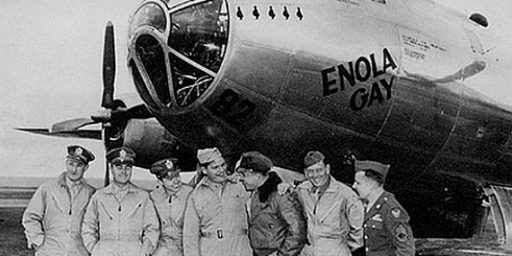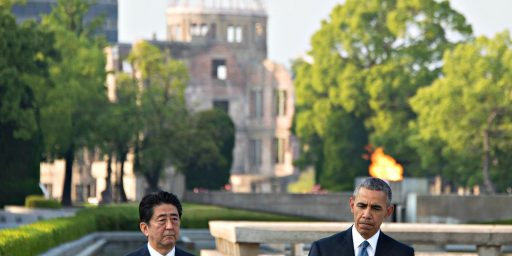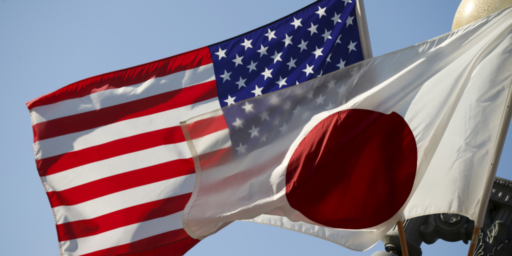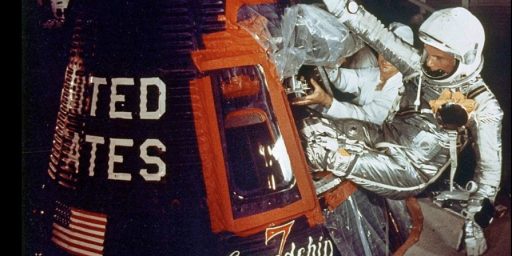General Paul Tibbets, Pilot of Enola Gay, RIP
Brigadier General Paul Tibbets, best known as the pilot of the Enola Gay that dropped the Little Boy atomic bomb onto the Japanese war-supporting city of Hiroshima, has died at the age of 92. In recent years he has made the news about being unrepentant over what some vocal (revisionist) critics consider a war crime.
Paul Tibbets, who etched his mother’s name — Enola Gay — into history on the nose of the B-29 bomber he flew to drop the atomic bomb over Hiroshima, died Thursday after six decades of steadfastly defending the mission. He was 92.
Throughout his life, Tibbets seemed more troubled by other people’s objections to the bomb than by him having led the crew that killed tens of thousands of Japanese in a single stroke. The attack marked the beginning of the end of World War II.
Tibbets grew tired of criticism for delivering the first nuclear weapon used in wartime, telling family and friends that he wanted no funeral service or headstone because he feared a burial site would only give detractors a place to protest.
And he insisted he slept just fine, believing with certainty that using the bombs on Hiroshima and Nagasaki saved more lives than they erased because they eliminated the need for a drawn-out invasion of Japan.
Considering the estimates AT THAT TIME were over a million Allied casualties, and more than that on the Japanese side, I think Tibbets has the moral high ground here. The war ended in August 1945 only because of the unprecedented entry of the Emperor into Japanese politics, after the atomic bombs. The Generals and Admirals were generally ready to fight to the last man standing in Japan, until the Emperor said no.
Tibbets, a 30-year-old colonel at the time, and his crew of 13 dropped the five-ton “Little Boy” bomb over Hiroshima the morning of Aug. 6, 1945. The blast killed or injured at least 140,000.
I’m not sure what that phrase means, “or injured.” Today it means a broken fingernail, but then it was more significant, as the WaTimes coverage clarifies quoting Tibbets,
“I remind you, we were at war. Our job was to win. Once the targets were named and presidential approval received, we were to deliver the weapon as expeditiously as possible consistent with good tactics,” Gen. Tibbets once recalled. “The objective was to stop the fighting, thereby saving further loss of life on both sides.”
Estimates of deaths in Hiroshima top 140,000 within one year of the blast, which rose up in a massive mushroom of smoke and fire, the shape and image itself destined to become a visceral cultural icon in the years to come. The U.S. dropped a second atomic bomb on Nagasaki 72 hours later; the Japanese surrendered shortly thereafter, ending the war.
“It did in fact end the war,” said Morris Jeppson, the officer who armed the bomb during the Hiroshima flight. “Ending the war saved a lot of U.S. armed forces and Japanese civilians and military. History has shown there was no need to criticize him.”
Former U.S. Sen. John Glenn, a former Marine fighter pilot, said people who criticized Tibbets for piloting the plane that dropped the bomb failed to recognize that an allied invasion of Japan, which the bomb helped avert, would have resulted in the deaths of several million people.
“It wasn’t his decision. It was a presidential decision, and he was an officer that carried out his duty,” Glenn said. “It’s a horrible weapon, but war is pretty horrible, too.”
Tibbets said in 2005 that after the war he was dogged by rumors claiming he was in prison or had committed suicide.
“They said I was crazy, said I was a drunkard, in and out of institutions,” he said. “At the time, I was running the National Crisis Center at the Pentagon.”
The difference to today is that the military would have a dozen Colonels/Captains, and a General/Admiral in charge for a similar program – and I’d guess there were more generals then.
Author Richard Rhodes said Tibbets’ feelings about the bombing he helped plan embodied public opinion at the time.
“He was so characteristic of that generation. He was a man who took great pride in what he did during the war, including the atomic bombing,” said Rhodes, who wrote “The Making of the Atomic Bomb.”
“It’s hard for people today to think about the atomic bombings without feeling they were just out and out atrocities, but people at the time had a very different sense of what they needed to do,” Rhodes said
An exceptional man — Colonel at 30 (even Lt Colonel at 30 is an achievement).
For details on his long Air Force career, see his updated USAF bio He was in the Air Force (Army Air Corps) for almost 20 years after Hiroshima including several major commands, but he is known only for one event.
And via DefenseTech comments, I find this link for his interview with Studs Terkel
Note: I have been at ground zero in Nagasaki.






I was notified of the loss via an email from his son.
My mother worked for him and his business partner for several years.
It is a shame that he requested to be buried in an unmarked grave to avoid making himself a gathering point for people with a political agenda.
But in a way it tells you a lot about the man.
It wasn’t that uncommon to have 30 year old Colonels during the war, especially in the Air Corps. Curtis LeMay was a First Lieutenant until Jan 40 (at age 33), and ended the war a Major General (reference from Wikipedia).
Of course it was a war crime — like Tokyo, Dresden, and Hamburg — but since we didn’t see fit to prosecute anyone for those, it would be odd to single out Tibbets.
Richard Frank’s Downfall makes the most persuasive case for the A-bombings that I’ve seen, but ducks the larger question of whether we should have been burning down cities (women, children, babies, the old and the sick) in the first place. He opens with the horrors of the Tokyo firestorm, which probably killed more people than either Hiroshima or Nagasaki did.
drop one now and get the gulf war over with! thank you!
In the eyes of a Military Person of 23 years and a history buff–the world has lost a true hero who ended a variety of persecution for a lot of people. Yes some died but if this had not happened who would be in charge. Think of how the Gulf War in general has been or could of been if the war was not happening.
Yes we missed the boat back in 1991-92 and should have finished it then–but who knew the hold that was in place–that is why the troops are back there now.
Prayers and thoughts go out to all that are serving now and to their families as they wait.
“(women, children, babies, the old and the sick)”…you forgot little puppies…
Things were done differently by all parties back then. We did what was necessary.
I suggest to those who think the use of nukes on Japan constitutes a war crime. Maybe a law lesson or two, as well as a course in history not taught by an America hater. Ask the Chinese of Nanking what the Japanese deserve for what they did. Ask the men of the USS Arizona the same question. The use of atomic weapons actually saved lives that would have been lost had the allies invaded Japan. People like Anderson are fools. They are undeserving of the freedom bought for them with the blood of brave American GIs. In my opinion, their ilk should be given to the kind hands of our enemies. Amongst which they should feel right at home. Till the knives come out.
Things were done differently by all parties back then. We did what was necessary.
The A-bombs were not necessary to win the war against Japan. Japan had no navy left and depended on imports to survive. Blockade was the obvious solution, tho itself liable to kill many civilians.
More importantly, the Soviet nonrenewal of its treaty with Japan (the day before Nagasaki), which was no surprise to us, dashed their last hopes for a deus ex machina.
Killing tens of thousands of civilians as a terror tactic, which is exactly what we did, is not “necessary” in any sense of the word.
I don’t have much respect for the people who do not understand why we brought a swift, honorable, and just end to WWII in the Pacific.
Invading and conquering Japan would have brought forth many more casualties on both sides than the bombing of Hiroshima and Nagasaki. The civilian population of Japan proved that they would fight to the death in the battle of Okinawa. I think that battle, in the latter stages of the Pacific War, was one of the deciding factors that convinced the leaders in our government that destroying vestiges civilian populations in Japan would hasten an end to the war. And thus, saving American lives. Good call, Thousands of them equated to one of us…and I believe in the equation…if killing thousands of them would have save one of us…so be it…that was a good thing.
And if you look at the great leaders of WWII, Churchill, Roosevelt, and Truman; they wrestled with moral dilemmas and decisions they took to their graves.
None of these leaders ordered their men out to die, or their enemies destroyed because they harbored some unique, distorted concept that killing the most human beings was an indication they won the war.
I believe that the bombing these two Japanese cities not only saved American lives, it saved many Japanese lives.
I don’t have much respect for the people who do not understand why we brought a swift, honorable, and just end to WWII in the Pacific.
Really? Me, I don’t have much respect for people who use words like “honorable” and “just” without having the slightest clue what they mean.
Different strokes for different folks, I guess.
Were the Japanese about to surrender? Would fewer lives, civilian especially, have been lost if the bombs had not been used?
Why Truman Dropped the Bomb
Takes a while, but eventually concludes that the “surrender” offer scheduled to be made via the USSR was phony –
` The Japanese did not see their situation as catastrophically hopeless. They were not seeking to surrender, but pursuing a negotiated end to the war that preserved the old order in Japan, not just a figurehead emperor. Finally, thanks to radio intelligence, American leaders, far from knowing that peace was at hand, understood–as one analytical piece in the “Magic” Far East Summary stated in July 1945, after a review of both the military and diplomatic intercepts–that “until the Japanese leaders realize that an invasion can not be repelled, there is little likelihood that they will accept any peace terms satisfactory to the Allies.” This cannot be improved upon as a succinct and accurate summary of the military and diplomatic realities of the summer of 1945.`
Also points out non-Japanese civilian deaths would continue –
`This brings us to another aspect of history that now very belatedly has entered the controversy. Several American historians led by Robert Newman have insisted vigorously that any assessment of the end of the Pacific war must include the horrifying consequences of each continued day of the war for the Asian populations trapped within Japan’s conquests. Newman calculates that between a quarter million and 400,000 Asians, verwhelmingly noncombatants, were dying each month the war continued. Newman et al. challenge whether an assessment of Truman’s decision can highlight only the deaths of noncombatant civilians in the aggressor nation while ignoring much larger death tolls among noncombatant civilians in the victim nations.`
“offer scheduled to be made via the USSR was phony -”
You got that right… The Russians saw the opportunity to dominate Eastern Europe and gain control of China and Japan. The Russians wanted to try to negotiate a truce with Japan that would have eliminated any US influence in that part of the world.
By the end of WWII, it had been proven that the Germans murdered millions of European civilians, the Japs were as brutal, if not more brutal to the civilian populations of China and Southeastern Asia.
Instead of of bringing these civilizations and cultures to their knees, should we have resurrected the ghost of Neville Chamberlain, to go and talk to these despotic leaders and wait for them to utter “there will peace in our time.”
Anderson,
“Really? Me, I don’t have much respect for people who use words like “honorable” and “just” without having the slightest clue what they mean.”
“Different strokes for different folks, I guess.”
You are right, I would never try to define “honorable” and “just” to you. But, based on your “Cum by Yah” sense of foreign policy, leads me to think that I was and continue to be more “right” than “wrong.”